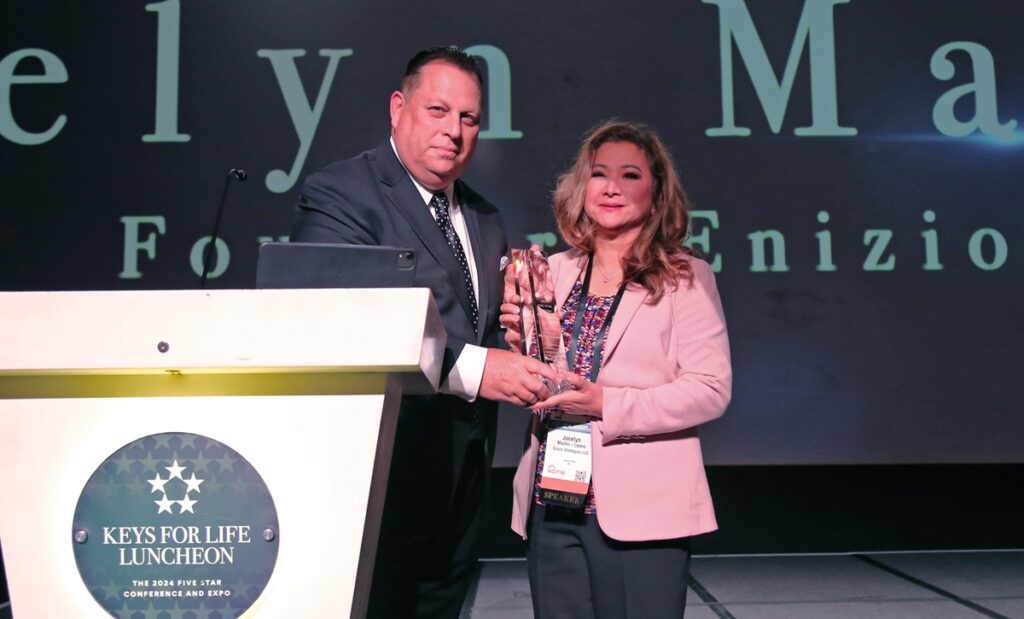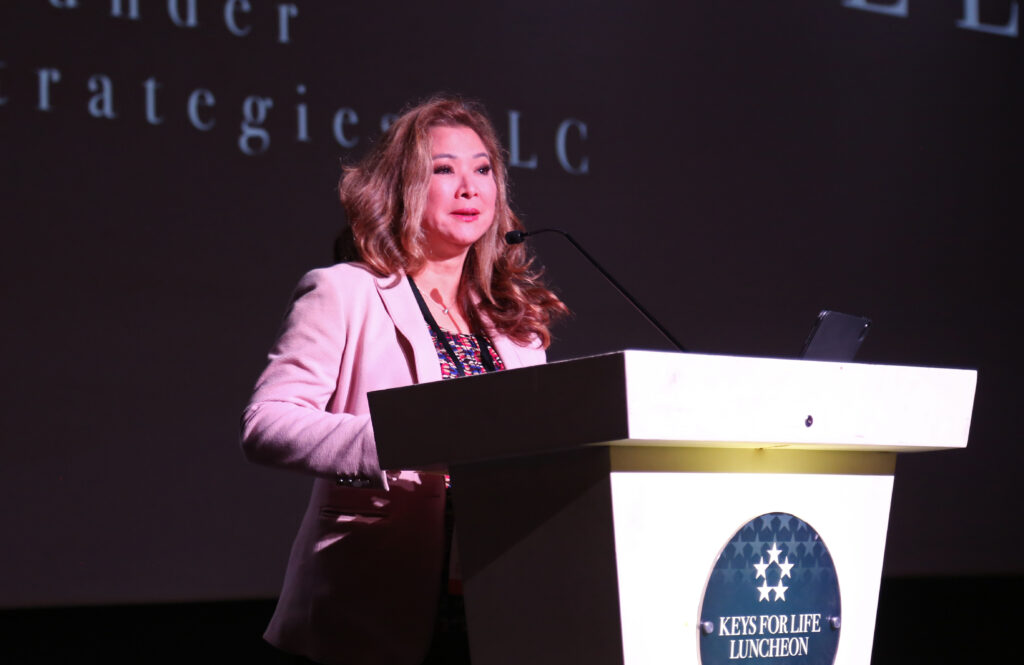During the 2024 Five Star Conference & Expo, held at the Omni Hotel in Dallas in late September, the Five Star Institute presented the 2024 Lifetime Achievement Award during the Keys for Life Opening Luncheon. This year’s Lifetime Achievement Award recipient was Jocelyn Martin-Leano, Founder of Enizio Strategies LLC.
Martin-Leano, who also served as the Chair of Five Star’s National Mortgage Servicing Association (NMSA) from 2022-2024, established Enizio Strategies as a professional services company focused on equipping leaders with solutions that align strategy, capital, operations, risks, talent, and culture. Before founding Enizio Strategies, she was President of Rushmore Loan Management and served on both public company and nonprofit boards.
Other industry roles Martin-Leano held include serving as COO of a mortgage insurance company, president of a home equity bank subsidiary, and progressive leadership roles at several banks. She graduated from Harvard’s Advanced Management Program, obtained her Executive MBA from St. Mary’s College (California), and has an undergraduate in industrial engineering.
MortgagePoint had the opportunity to chat with Martin-Leano during the Five Star Conference to discuss her accomplishments and the state of the industry.
Q: How do you go from being an industrial engineer at Timex to working at Citibank in an executive capacity?
Jocelyn Martin-Leano: I never thought, in my wildest dreams, I would be in the mortgage business. I worked on assembly lines doing productivity, process design, etc., and answered an ad from Citibank seeking a “process engineer to help figure out the origination process.” I grew up on the origination side of the fence, and from there, started to work on different parts of the business, like time and motion studies for appraisers. I did all kinds of nuts-and-bolts work, including capacity planning and all of that for Citibank’s business.
There are two important things I learned from my time at Citibank. One, there is no degree that I know of in any university about mortgages. Everybody gets into the mortgage industry through a different path. This path was very helpful to me in the sense that I understood what it took to build and how to put parts together. When you have a breakage in the flow, I know where to find it and fix it. I find those skills to be very helpful in everything that I did, building different corporations and businesses. It was great preparation for what was to come.
The second thing is that engineers are critical thinkers, so you can dispassionately and objectively look at things because you know how to look at things from a clinical lens.
The third thing that is interesting about engineering is that it requires you to understand what your “givens” are and then work the best out of what you have been given, and so much of that is needed in decision-making. You may not always know all the factors, but then you understand, okay, here is what is given, and how do I solve the problem given what I have?
The final part about engineering is that it’s really helpful in optimizing for solving variables. It gives you focus because if you are trying to solve for “X, Y, and Z” all at the same time, that’s hard to do. So, when you focus on one, you get that done, and then you solve for the next one, and the next one, and so on. It just gives you a nice frame for approaching and mentally looking at things.

Q: We have some amazing women leaders in today’s industry, but the industry remains very male-dominated. What are some of the difficulties you encountered or had to deal with coming up in a very male-dominated industry? What advice would you offer to women who are coming up the ranks behind you?
Martin-Leano: The first one is ambidexterity because sometimes you must consciously think of your lenses and what you are using. For example, when you are working with a lot of men, it’s less about the emotion, and more about setting expectations because they like to fix things. It’s very cut and dry … if something’s broken, let’s go fix it. The engineering aspect helps me translate things better.
If you are talking with women, it is more about the shared experience. How are we all sensing things? How are we processing the world? It may not be fixing. The art of fixing is in the talking … it’s two different things.
I learned at an early age that when you are talking to people in senior management, especially men, you must have your act together in terms of being able to clarify a problem and what the givens are. If you are running around in circles, it just does not make sense.
Women tend to think more holistically. We go around, we come back, and we also know how to navigate. We get to the same endpoint, it’s just a different path. You must understand the audience and how to best operate with them. I gave you stereotypes, but not everybody is like that. Some males like to go around and be different that way. And there are females who are very much like men and worse than men in terms of being cut and dried. It doesn’t cut across genders necessarily, but more like how they frame their thinking. So that’s number one.
The second thing about males is making them comfortable enough where you find an advocate for you. There are male sponsors and female sponsors, and you need both. It gives them the comfort that they do not have to do extra work for you, that you blend in and you’re smooth, frictionlessly able to work with them.
Q: What advice can you pass on to people who may be coming up in the industry? Are there people you have mentored? How do you feel like your experience has helped those people?
Martin-Leano: There is a question here about legacy, and I think my legacy will be measured in terms of not how many businesses I helped build, and how much money I help people make, but in terms of how many people I have helped get to their highest potential. I know of a few that I was able to be part of their growth, and they have reached positions even higher than mine. The most important thing to me is being able to give back.
For women, I think actually going out and being seen is important, otherwise, we just think the system sees us, and we are not seen. There is an art to that because you do not want to be the aggressive feminine type. That’s always an issue … looking like you are aggressive and self-promoting, but there is a way to network, be seen, and be comfortable describing your value. It’s not natural for women, so I would teach them how to do that.
The third thing is continuous learning, because we run out of time, we do not keep current with the times. In general, mentorship is one thing that I would change if I was talking to my younger self to understand business models. In my consulting job, I go around, I see different companies, and the value lies in people understanding your business model. It should go all the way to the lowest level, the lowest-ranked person needs to understand the vision.
Many leaders are lazy about casting vision. It should start from the top, and what you are trying to do, and cascade that down. There is a book by Patrick Lencioni, The Four Obsessions of an Extraordinary Executive: A Leadership Fable, that affected me. The book explains that you must be obsessive about casting vision and then making sure the people all understand it because it’s much easier for them to rally around the vision if they know it.
In general, when giving mentorship advice, that would be the number one lesson, always to paint the vision. What are you trying to do first? And then what are you asking individuals to do to support this vision? Being very passionate about vision is important.
The second thing is to understand your business model. How are you making money? A lot of people do not know why you are here. This is a corporation, we make money, and if we make money, we have jobs for people and have a sustainable business. Many will come in and just say, “This is what I’m supposed to do today.” But how does it fit the overall strategy?
Q: You served as Chair of the National Mortgage Servicing Association (NMSA) from 2022-2024, a nonpartisan organization driven by senior executive representation from the nation’s leading mortgage servicing organizations. What were some of your greatest accomplishments during your time with NMSA?
Martin-Leano: My time at the NMSA was great in terms of being able to connect different leaders in different industry groups. If I was running for president, I would sponsor a coalition group that includes the Mortgage Bankers Association (MBA), the NMSA, Urban League, and everybody connected with housing policy and maybe even just sponsor a once-a-year get together and get people connected because together as an industry, we are better. That sounds trite, but it’s true.
Look at the topic of artificial intelligence (AI). That’s another thing I’m passionate about because of the adoption rate. Some may already be using a smartwatch, some ChatGPT, some a Ring doorbell system, and some an Alexa. The personal adoption of AI tools is there, but then in our business world, adoption is slow. Why is that? One reason is fear. There’s a thing called containment. When nuclear arms came into being, America and Russia said, “Oh, we can mutually destroy ourselves with this, so let’s look at containment because too many of these are not going to do anybody any good.” Sometimes with AI, there’s that concept of containment, which is okay. We don’t want it to be off the skids where it’s doing harm. We want it to do good, and how we can make it do good for our business.
I’ll give you an example … call centers. Call centers are not unique to mortgages. There are call centers for credit cards, for anything, help desk, and insurance claims. There’s so much maturity now in the use of AI and call centers that we should be in a coalition and say, “Okay, where do we feel comfortable doing this?” And then regulators could also weigh in and say, “Okay, here’s our perspective.” If you look at the FHFA, they have their own AI thing, as does Freddie Mac, Fannie Mae, and HUD, but who is bringing it all together to tie it in? Why are we all reinventing the wheel?
From an NMSA perspective, if I had stayed longer, I would have brought on more coalitions.
Q: Looking back on your career, what is some advice you have for balancing professional success versus personal commitments? How do you find that balance especially when, as you pointed out, women have more tasks than their male counterparts?
Martin-Leano: When I first started in the industry, you had to be in the office. You had to ask permission to pick up a sick kid. Today, work and life have blended where you do not see the blurred lines, which works to our advantage and our disadvantage. It’s a disadvantage because your life and your work are permeating each other and sometimes you don’t know where to begin and where to end. But it’s also good because when you need it, you can make it blend.
I know people who would stop at 4:00 p.m., pick up their child, and then resume the workday, and that’s okay. In the old world, it would not have been. There were times in my life when I took pay cuts, and I requested to work part-time depending on the age of my kids because I have four kids, so imagine.
The second thing is just knowing your priorities and who you are. One day, I was driving with my kids, and I was having a bad day and I said something like, “If I didn’t have you kids, I would have been further in my career.” That was something I’ll regret saying for the rest of my life. My kids replied, “Well, stop thinking about us and just do whatever you want to do, Mom.” So, there will always be trade-offs. It wasn’t like that before. This is so much easier now. It’s taxing on you because there are no lines. Before, when you were driving home, you used the drive time to decompress and put on your mom hat. Now all the hats are just simultaneously being put on and off.
Q: Do you think that change was primarily just a result of the disruption of COVID-19? Or did that just accelerate the process?
Martin-Leano: I think it accelerated the process. People were already starting to become more aware of work-life balance. The prevalence of mental health issues has caused people to think more about what is important. Our children, the generations after us, are less about driving for ambition than we are. In a way, we have given them a better life.
When you hear the story about “walking five miles in the snow,” they don’t walk five miles in the snow. So, we had to overcome much more than they did, and life is easier for them. But at the same time, they are a generation that is not used to relationships. They are a generation tethered to a phone. They don’t have the benefit of large families and large communities. So, there’s always a trade in a generation. That’s what they have instead. Their cards are different, just as our cards were different when we were growing up.
Q: Looking back on your career as a whole, what are some of the things you’re most proud of? What are your greatest wins, the things that you’d put up on your wall and look back on if you could?
Martin-Leano: Some of them were good, and some were bad. The good thing is that I have known enough people who have progressed in their careers, and I would like to say I played a role in that. The second thing is that I’ve created tribes. The workforce is a family. It’s a tribe and you belong, and when you come to work every day, you belong. I’ve created large groups of people like that with lasting relationships.
For example, I recently attended a reunion with my former Rushmore Loan Management Services friends. Some other people wouldn’t have that, but we created a strong tribe. When you create tribes like that which bleed into personal relationships, those are important. That’s what remains in life … having helped a lot of people in their career journey and creating social groups because we created families and tribes.
One thing that’s been hard for me is unfortunately that I have been part of business model exits, and my pride there is that those exits were done as gracefully as possible. They’re never easy. But I cannot remember a time when there was a backlash.
I think I raised good kids even though I was not a traditional mother. I have been married for 36 years, so somehow, I did something good there, and that is a very important legacy to look back on.
Q: Any final comments?
Martin-Leano: As I receive the Lifetime Achievement Award from the Five Star Institute, I am not done, and I am iterating that as we go along. Being a consultant is interesting, as you get to go to different places. I’d like to think that I bring light where light has to be, and I’m less deliberate about it. It is kind of fun watching things evolve. I am very structured, and this time, I am not structured.
I am letting the universe or providence or whatever bring me to where I need to be sent. So, it is kind of fun. I am a student of humanity. I love watching teams and watching people … I learn so much from them. Some people are good examples, and some are on this Earth to serve as bad examples, and we can learn from them.
What Jocelyn’s Colleagues Have to Say …
“She’s the smartest person in the room—maybe because she’s just that smart, but also because she’s always so prepared.”—Linda Noah, Executive Director, Petros Network
“Jocelyn is an incredibly thoughtful, insightful leader who participated fully in the program. She does the work. She puts her time in. She doesn’t take shortcuts. And she devotes herself 100 plus percent to whatever she’s doing.”—Vicki Good, Educational Portfolio Director, Harvard Business School
“Professionally, Jocelyn’s thoughtful and diligent work made my tenure as the CEO of Rushmore Loan Management Services very successful. Everyone should have a Jocelyn in their life.”—Terry Smith, CEO, Rushmore Loan Management Services, LLP
“Jocelyn has been my friend, my coach, my supporter for the past 15 years. She’s a giving, caring person … she is a very godly, very good woman and deserving of any recognition. … She’s one of the hardest working people and most productive executives I’ve ever worked with in my life. She’s worked in every facet of the industry, in banking, nonbanking, and mortgage-related companies.”—Thomas Walsh, EVP, Rocktop Technologies; formerly President, Rushmore Loan Management Services






